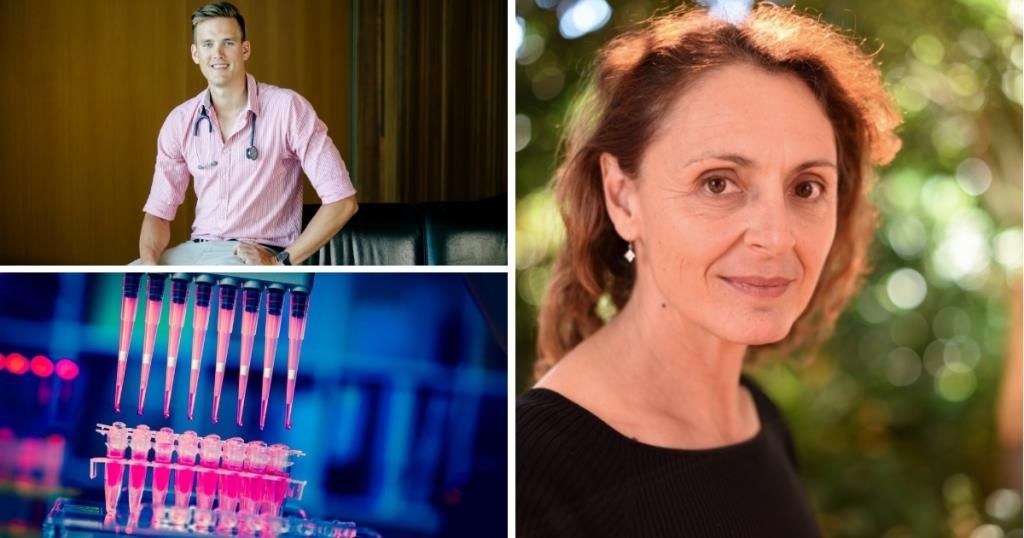John Maunder’s incredible Story

By the age of 85, one in two Australian men and women will be diagnosed with cancer*.
In addition to the heartbreaking shock of a cancer diagnosis, patients are commonly faced with the prospect of weeks and months of gruelling chemotherapy treatment.
When a patient’s cancer cells are attacked during chemotherapy, so are other rapidly cycling cells that protect the patient, typically impacting the mouth, stomach and bowel, skin, hair, and their general immunity to infection—resulting in a range of painful side-effects.
But Mater Research’s Associate Professor Ingrid Winkler is hoping to change this.
She’s leading an incredible study that approaches the issue in two ways; by protecting the normal stem cells in bone marrow from the effects of chemotherapy, and by investigating the balance between good and harmful bacteria in the intestine during treatment.
The research has the potential to enable patients to suffer less of these painful side-effects, recover faster and minimise the need for hospitalisation.
“By reducing these side effects, patients are able to return home faster to resume their normal lives,” says Associate Professor Winkler.
Someone who knows all too well how quality of life can be impacted by cancer treatment is John Maunder.
At the age of just 21, while out at lunch with his family to celebrate his bachelor degree graduation—which was to take place in a few hours—John found out he had blood cancer.
“At that stage I really didn’t understand what was going on, it knocked me for six. I went back to the table and told my parents and we cried.”
John’s diagnosis had come about purely by chance; as a result of standard medical checks he needed to complete prior to commencing his studies in medicine.
John started chemotherapy on New Year’s Eve, and continued receiving treatment twice a fortnight for six months, and then monthly for another two years.
“My first day of chemotherapy was a very long and hard day,
I have never felt so terribly sick ever before in my life as I did during that time.” John recalls.
Despite receiving a devastating diagnosis and dealing with the almost constant side effects of his chemotherapy, John began his studies in medicine as scheduled, and continued the course throughout his treatment.
“I would have treatment on a Friday, be extremely sick all weekend and then go back to university on Monday.”
“I also had a lot of anxiety about the treatment, so I would start feeling the sickness again before I had even been back to have another round.”
For patients like John, Associate Professor Winkler’s research could be the difference between being able to be out in the community, and being confined to a hospital bed.
“It’s a real risk to be out somewhere like a university campus when your health is so vulnerable— I was only able to do it by getting injections to boost my immunity,” John said.
Pre-clinical studies are showing promising results, with a reduction in chemotherapy-induced side effects.
Associate Professor Winkler and her team hope that, in the future, both of these new treatment strategies may be used in patients to improve their cancer therapy outcomes.
Six years on from his diagnosis, and John has finished his degree and is working as a doctor, using his own experience to help his own patients.
“Cancer will shape my future, especially my future career as a doctor,” John said.
“I want to use my career to give back to those who need it—that will be the biggest reward for me.”
“I’m only alive today because of the advances in modern medicine, and the support provided by others.”
Your support of the Mater Cars for Cancer lottery helps to drive vital medical research to give patients like John the chance to receive cancer treatment with fewer side-effects. Purchase your tickets today.
*Source: www.aihw.gov.au

We would love to hear from you
We would love to know what you think about Mater Lotteries!
1800 067 066
All times displayed in your local timezone unless stated otherwise. Mater Foundation Ltd as trustee for Mater Foundation is registered as a charity with the Australian Charities and Not-for-profits Commission. ABN 96723184640. All prices are displayed in AUD.



